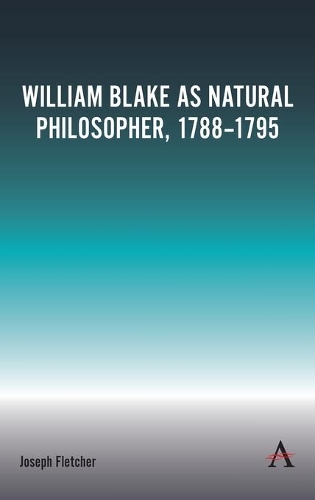
William Blake as Natural Philosopher, 1788-1795
(Hardback)
Publishing Details
William Blake as Natural Philosopher, 1788-1795
By (Author) Joseph Fletcher
Anthem Press
Anthem Press
7th December 2021
United Kingdom
Classifications
Professional and Scholarly
Non Fiction
Nature and the natural world: general interest
Literary studies: poetry and poets
Philosophical traditions and schools of thought
821.7
Physical Properties
Hardback
274
Width 153mm, Height 229mm, Spine 26mm
454g
Description
William Blake as Natural Philosopher,1788-1795 takes seriously William Blakes wish to be read as a natural philosopher, particularly in his early illuminated works, and reveals the way that poetry and visual art were for Blake an imaginative way of philosophizing. Blakes poetry and designs reveal a consistent preoccupation with eighteenth-century natural philosophical debates concerning the properties of the physical world, the nature of the soul, and Gods relationship to the material universe. This book traces the history of these debates and examines images and ideas in Blakes illuminated books that mark the development of the monist pantheism, which contends that every material thing is in its essence God, to the idealism of his later period, which casts the natural world as degenerate and illusory. The book argues that Blakes philosophical thought was not as monolithic as has been previously characterized, and that pantheism is important to understanding his early works because it entails an ethics that respects the interconnected divinity of all material objects not just humans which in turn spurns hierarchical power structures.
Reviews
William Blakes complex poems and images make formidable demands. The first words that come to mind for most of his struggling reader/viewers may be religion or imagination." But there is a strong critical tradition of approaching Blakes work from the less expected angle of science and philosophy. Writing In the tradition of such foundational critics as Jacob Bronowski and Donald Ault, Joe Fletcher leaves no question that he is their worthy successor. Morris Eaves, Professor of English and Richard L. Turner Professor of Humanities, Director, A. W. Mellon Graduate Program in the Digital Humanities, the School of Arts & Sciences, University of Rochester, Co-editor of William Blake Archive and Blake/An Illustrated Quarterly
We know William Blake as a great Romantic poet, printmaker, and painter. Blake knew himself also as a philosopher and, as Fletcher persuasively demonstrates, was correct to do so. William Blake as Natural Philosopher, 1788-1795 reveals how Blake's early illuminated poetry imaginatively engaged with contemporary natural-philosophical debates concerning matter, the soul, and organic life. Fletcher traces these discourses through the long eighteenth century, and he is the first to argue that during this seven-year period, Blake both develops and withdraws from a pantheistic philosophy that views the material world as essentially divine. His innovative examination of both Blake's texts and designs provides the historical and theoretical grounds for new readings of Blakes early works and a reevaluation of the significance of pantheism to Blakes thought. Joseph Viscomi, James G. Kenan Distinguished Professor of English Literature, University of North Carolina at Chapel Hill
Joseph Fletchers William Blake as Natural Philosopher, 1788-1795 is a carefully researched, original engagement of William Blakes early works with the natural philosophers of his day, encompassing figures such as Leibniz, Berkeley, Hume, Descartes, Priestley, and Erasmus Darwin. I highly recommend it for anyone researching Blake, Blake and natural philosophy, or eighteenth-century thought and the history of science. James Rovira,Independent Researcher, US
Joseph Fletcher's William Blake as Natural Philosopher is meticulous in its research, wide-ranging in its implications, and fascinating in its conclusions. While many are aware of the deeply entrenched philosophical tussle between Blake and Locke, Fletcher extends this argument to consider not only Enlightenment contemporaries but also classical thinkers who shaped his approaches to understanding the world and the soul. As such, this is an important addition to our appreciation of the early works of Blake and one that will be appreciated by scholars seeking insights into his art and writings in the late eighteenth century. Jason Whittaker, author of Divine Images: The Life and Work of William Blake, University of Lincoln
Author Bio
Joseph Fletcher is Assistant Teaching Professor in the Department of English and Comparative Literature at the University of North Carolina at Chapel Hill, where he also serves as Managing Editor of the William Blake Archive.
